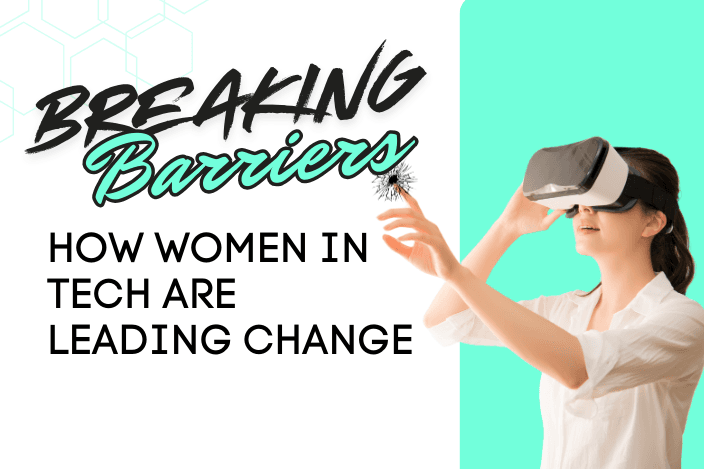Breaking Barriers: How Women in Tech Are Leading Change in 2025

Elisa Di Pasquale
Leadership
Women in tech have been breaking barriers for decades, yet challenges persist in representation, leadership, and equal pay. The technology industry thrives on innovation, and gender diversity plays a crucial role in driving progress.
Studies show that diverse teams lead to better decision-making and higher revenue. As companies recognize the importance of inclusivity, women are stepping into leadership roles, launching their own startups, and making major contributions to artificial intelligence, cybersecurity, and software development.
To thrive in today’s rapidly evolving tech industry, women must embrace a growth mindset—a concept essential for success in leadership. Learn more about why every leader needs a growth mindset in 2025 here.
The History of Women in Tech
Women have been at the forefront of technological advancements since the early days of computing. Ada Lovelace is often credited as the first computer programmer, while Grace Hopper developed the first compiler, making programming more accessible.
During the Apollo era, Margaret Hamilton’s software engineering expertise played a crucial role in NASA’s moon landing. Despite these contributions, women’s roles in technology have often been overlooked. Today, there is a growing effort to recognize and celebrate these pioneers.
Current Gender Disparity in Tech
While progress has been made, women still face significant challenges in the tech industry.
- Women hold only about 28% of tech jobs globally.
- Fewer than 5% of Fortune 500 tech CEOs are women.
- Only 2.3% of venture capital funding goes to female-led startups.
The lack of representation in leadership positions continues to be a major hurdle. Addressing these disparities requires structural changes, such as mentorship programs, policy reforms, and corporate diversity initiatives.
Women Who Revolutionized Tech
Several influential women have reshaped the technology landscape:
- Sheryl Sandberg – Former COO of Meta, advocate for women in leadership.
- Susan Wojcicki – Former CEO of YouTube, instrumental in digital media growth.
- Reshma Saujani – Founder of Girls Who Code, empowering young girls in STEM.
These women have broken barriers and continue to inspire the next generation of female leaders in tech.
The Role of STEM Education for Women
Encouraging women to pursue STEM (science, technology, engineering, and mathematics) careers is crucial for closing the gender gap. Organizations like Girls Who Code, Women Who Code, and Google’s Women Techmakers provide mentorship, training, and scholarships to support women in technology.
For women looking to develop leadership skills alongside their technical expertise, consulting services like Elisa Dipa Consulting offer valuable insights on career growth and personal development.
Women in Leadership Roles in Tech
Despite challenges, many women have risen to the top in leading tech firms.
- Safra Catz (CEO of Oracle)
- Gwynne Shotwell (President of SpaceX)
- Lisa Su (CEO of AMD)
These leaders are proving that gender is not a barrier to success in the tech industry. However, more work is needed to ensure that leadership opportunities are equally accessible to women.
Challenges Women Face in Tech Careers
Women in tech often encounter:
- Gender bias in hiring and promotions
- Lack of mentorship and sponsorship
- The gender pay gap
- Work-life balance struggles
Addressing these issues requires a cultural shift within organizations, with a focus on inclusivity, equal pay, and professional development programs.
Women’s Impact on Tech Innovations
Women have played a key role in advancing some of the most important technological innovations:
- Dr. Fei-Fei Li – AI and machine learning research
- Parisa Tabriz – Cybersecurity leadership at Google
- Sheila Warren – Blockchain and Web3 development
Their contributions highlight the importance of diversity in driving technological progress.
Corporate Initiatives Promoting Women in Tech
Many major tech companies have launched programs to support women in the industry:
- Google Women Techmakers – Scholarships and mentorship
- Microsoft Diversity Hiring Initiatives – Programs to increase female representation
- IBM AI Mentorship for Women – Support for women in artificial intelligence
These initiatives are crucial for fostering an inclusive tech ecosystem.
Women Entrepreneurs and Startups in Tech
Female entrepreneurs are making a mark in the startup world, despite the challenges of securing funding.
- Whitney Wolfe Herd – Founder of Bumble
- Anne Wojcicki – Co-founder of 23andMe
Funding remains a major hurdle, but organizations like SheEO and Female Founders Fund are helping bridge the gap by investing in women-led startups.
How Men Can Support Women in Tech
Men play an important role in promoting gender equality in the workplace. They can:
- Advocate for equal pay
- Mentor female colleagues
- Support inclusive hiring practices
By fostering a culture of respect and fairness, workplaces can become more inclusive and supportive of women.
Future Trends for Women in Tech
By 2030, we can expect:
- More women in AI, cybersecurity, and cloud computing
- Increased funding for female-led startups
- Greater emphasis on inclusive work environments
Companies are also adopting more flexible work policies to support work-life balance, making it easier for women to thrive in tech careers.
Frequently Asked Questions
What percentage of women work in tech?
Currently, about 28% of the global tech workforce is female.
What are the best tech jobs for women?
Popular roles include software engineering, data science, AI research, cybersecurity, and product management.
How can companies promote diversity in tech?
Organizations can reduce hiring biases, provide mentorship programs, ensure equal pay, and foster inclusive workplace cultures.
Are there scholarships for women in tech?
Yes, programs from Google, Microsoft, and Girls Who Code offer scholarships and training for women in technology.
What challenges do women face in tech?
Women often encounter gender bias, wage disparities, limited access to mentorship, and difficulty securing funding for startups.
Conclusion
Women in tech have made remarkable progress, but challenges still exist. By fostering education, mentorship, and workplace equality, we can create a future where women have equal opportunities to lead and innovate in the technology industry.
The tech world benefits from diverse perspectives, and as more companies, organizations, and individuals champion gender diversity, the future looks bright for women in technology.
For professional coaching and leadership development, explore Elisa Dipa Consulting, where women can gain the skills needed to excel in their careers.
Related Articles

The Future of Work: Are You Prepared for AI and Automation?
AI and Automation are reshaping industries, transforming job markets, and redefining the future of work. While these advancements bring efficiency and...
Elisa
Why Every Leader Needs a Growth Mindset in 2025
Introduction The world of leadership is changing fast. The rise of artificial intelligence, the shift to remote and hybrid work, and evolving employee...
Elisa
